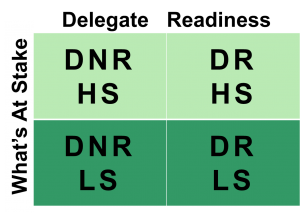To Delegate Or Not To Delegate: That Is The Question.
If you're following this series, you've already read about the 5 lame excuses managers give for not delegating and the one real reason so many managers do the work themselves. You've also read the 8 Essentials of Effective Delegating.
Like most managers who want to delegate more to develop their direct reports, you're probably struggling still with one more concern. You're right to hold back on delegating if you don't know how to work this out. It's a legitimate concern. Fortunately, it's also a concern we can readily address with a simple too.
That legitimate concern is this: Can we risk it?
After all, there is some risk -- real or perceived -- in every act of delegation. You may be getting the work done. Despite the lost development opportunities if you continue doing the work yourself, you just aren't sure the risk of handing it over to someone else is worth it.
When managers feel this way, it becomes the fallback position. This uncertainty can override all other thoughts about delegating.
Here's a replacement tool. It's a way to include risk assessment in your decisions about delegating. It's also a tool to challenge your fallback position and get you delegating more often.
It works like this. First, for the task at hand, determine if it the stakes are high or low. High Stakes (HS) means there truly is something risky about delegating this work. You'll determine what that means to you. Consider how quickly the work must be done, who the audience or end user is for the work, what the implications of an error would be, and how costly a mistake would be. Low Stakes (LS) means there is time, latitude and tolerance within this one task for potential error and rework.
Second, you'll also want to consider the individual you're considering for the delegated work. Specific to this task, you'll determine how ready the delegate is. In the graphic below, DR stands for "Delegate Ready" which means the individual is already able to take on more work and capable of tackling this kind of work, too. It does not mean the individual is already an expert in this type of work -- remember our aim is to delegate for development, so this is not an exercise in matching people with work they have already mastered.
The alternate choice is DNR, a Delegate who is Not Ready. This designation means the delegate is not currently able to take on additional work ADN you cannot shift work to free up time for this delegate to take on different work. It could also mean this delegate is not capable of learning or growing at this time due to other assignments or a proven lack of interest or competency. Be careful not to hastily bucket every person in every situation as delegates who are not ready -- that's not usually accurate and, if it is, you are not effective as a manager when it comes to hiring, onboarding, training, and performance managing your direct reports.
When you put these two considerations together, you get just four scenarios.
The lower right box is Low Stakes and a delegate who is ready (DR). In this situation, why wouldn't you delegate? If you're not delegating to this person in this situation, then you are going to be thought of as a control freak or someone who is unable/unwilling to trust others.
The lower left box is still Low Stakes but, in this case, the delegate is not ready (DNR). This is the perfect situation to provide learning and development. The stakes are low, so why not seize the opportunity to gradually stretch a direct report. You'll be working to shift this individual into the DR/LS box for the task.
The upper left box represents times when the stakes are high (HS) and the delegate is not ready (DNR). It would be irresponsible for you to delegate at a time like this. That shouldn't, however, be a permanent situation. Start now (and start small if necessary) to get a delegate ready for this task in the future.
The upper right box is the trickiest one. Many managers keep this work just because the stakes are high. Here's the problem: if you hoard this work, it precludes others' development. If people are ready for this work, they've earned the right to do it. How can you give them a chance to grow if they aren't given the work that helps them prove themselves?
Take some time to evaluate your current tasks using this tool. Delegate where the stakes are low so you get better at delegating using those 8 Essentials for Effective Delegation. Next, push yourself to get more delegates more ready for more tasks. Then, go for it. Trust your ready delegates even when the stakes are high.
If that still seems too risky, consider this. The biggest risks of all come from not developing people and trying to do much yourself.
 The CONNECT2Lead Blog and training programs are products of People First Productivity Solutions. We build organizational strength by putting people first. If you’d like to read more about the ways you can connect with your team and become more effective as a leader, subscribe to our weekly CONNECT2Lead Newsletter for special offers, content, and blog.
The CONNECT2Lead Blog and training programs are products of People First Productivity Solutions. We build organizational strength by putting people first. If you’d like to read more about the ways you can connect with your team and become more effective as a leader, subscribe to our weekly CONNECT2Lead Newsletter for special offers, content, and blog.

